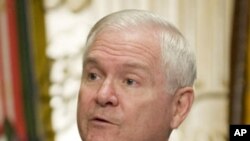U.S. Defense Secretary Robert Gates is urging caution on those who are calling for a timetable for an allied withdrawal from Afghanistan. Among those who have spoken about a "timetable" or an "endgame" in recent days are British Prime Minister Gordon Brown and U.S. President Barack Obama.
It was during a CNN interview this week that President Obama said his eagerly-awaited new Afghanistan strategy will include an "endgame." He said without the "discipline" a plan for ending the conflict would impose, the United States could find itself in "a multi-year occupation" that is not in its interests.
A day earlier, while emphasizing Britain's commitment to preventing the return of militant rule in Afghanistan, Prime Minister Brown said he wants an international conference in London next year designed in part to set a timetable for transferring security responsibility to the country's new forces.
"It should identify a process for transferring, district by district, to full Afghan control," he said. "And if at all possible we should set a timetable for transferring districts to Afghan control starting next year, in 2010."
But at a news conference Thursday, Secretary Gates urged caution.
"Clearly, there is a desire, I think, on the part of all of us to begin this process of transferring security responsibility as soon as possible," he said. "But it would be counterproductive to transfer that responsibility before the Afghans were ready and had the capacity to sustain the security when we turn it over."
Gates specifically argued against setting a timeline, although he indicated it might be possible to at least begin to fulfill Prime Minister Brown's desire for a security handover soon.
"I think I would rather have those on the ground in Afghanistan make the judgment call about when a province or a district was ready to be turned over, rather than [having] specific dates. That said, my assumption would be that there will be some districts and some provinces where that handover could come relatively soon," he said.
NATO's new secretary general, Anders Fogh Rasmussen, also weighed in on the issue this week. He said Tuesday at a conference in Edinburgh that a premature allied withdrawal from Afghanistan would enable al-Qaida to return and use the country as a base to launch "global jihad."
He said anyone who ignores the risks of too quick a departure "is not living in the real world." But at the same time, the NATO chief said the alliance might be able to set some time targets, in his words, "where conditions permit."




